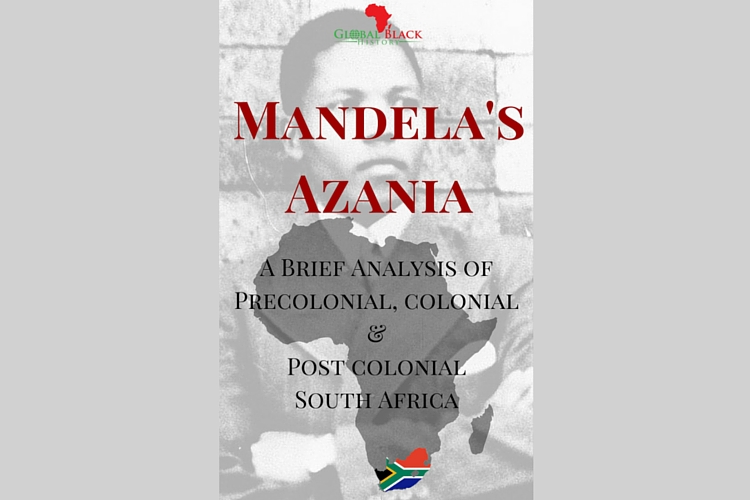
Mandela’s Azania: A Celebration of Freedom Day in South Africa
We are commemorating Freedom Day with the launch of Global Black History’s book; Mandela’s Azania: A Brief Analysis of Precolonial, Colonial and Postcolonial South Africa.
HISTORY
Freedom Day, April, 27th is a national public holiday and annual celebration of South Africa’s first non-racial democratic elections of 1994. It is significant because it marks the end of over three hundred years of colonialism, segregation and white minority rule and the establishment of a new democratic government led by Nelson Mandela and a new state subject to a new constitution. It is an occasion for the country to remember and celebrate the struggle for independence and triumph of democracy for all.
- February 2, 1990- the unbanning of the South African Communist Party (SACP), Pan African Congress (PAC) and other organizations.
- April, 1993- An interim, non racial constitution was agreed upon and adopted.
- April 27, 1994- Black South Africans finally cast their vote in the first democratic election.
- May 10, 1994- Nelson Mandela was inaugurated as the President of South Africa.
Freedom Day therefore serves as a reminder to us that the guarantee of our freedom requires us to remain permanently vigilant against corruption and the erosion of the values freedom and to build an active citizenry that will work towards wiping out the legacy of racism, inequality and the promotion of the rights embodied in our constitution.
MANDELA’S AZANIA: A BRIEF ANALYSIS OF PRECOLONIAL, COLONIAL AND POSTCOLONIAL SOUTH AFRICA
Nelson Mandela is often remembered as a strong proponent of racial and ethnic equality. However, after many years of an independent South Africa, there are cracks forming in Mandela’s philosophy of a rainbow nation. The West uses him as an icon to sell the notion of a peaceful transition to democracy in South Africa. While in South Africa, there are mixed feelings emanating from a genuine gratefulness for his role in bringing down apartheid but also the immense cost black Africans had to pay in 1994. More South Africans are speaking out about the huge sacrifices that the majority black population made to appease the white minority in the transition to democracy and black political rule.
 As Mandela’s funeral was broadcast in December 2013, one might have assumed by watching western media that Mandela’s funeral was the most well attended in recent history. However, from reports on the ground in Johannesburg, most locals did not attend and the stadium was only half full. To the critical eye this was a signal, an undertone which the western media chose to ignore. As more years have passed since 1994, there is growing discontent among some black Africans who have not seen the fruits of independence translate to tangible benefits.
As Mandela’s funeral was broadcast in December 2013, one might have assumed by watching western media that Mandela’s funeral was the most well attended in recent history. However, from reports on the ground in Johannesburg, most locals did not attend and the stadium was only half full. To the critical eye this was a signal, an undertone which the western media chose to ignore. As more years have passed since 1994, there is growing discontent among some black Africans who have not seen the fruits of independence translate to tangible benefits.
Many leaders have now openly questioned why black South Africans have not realized that dream of an independent and prosperous nation that they were promised. There is growing criticism and open dialogue coming from people such as Economic Freedom Fighters (EFF) leader Julius Malema, Andile Mngxitama, Soweto community activist Trevor Ngwane, Stellenbosch political Economist Sampie Terreblanche and even ANC insiders like Winnie Madikizela-Mandela and former minister Ronnie Kasrils.
The purpose of this book is to use a critical lens to evaluate Nelson Mandela’s role in shaping present day South Africa. This is accomplished by exploring the precolonial, colonial and postcolonial history of the nation to explain its present day predicament. The complications of present day South Africa can best be understood by learning the history of the Khoi, early Boer and English settlers and the conflicts that resulted as they encroached into the territory of the Zulu, Xhosa and native Khoi people. In addition, understanding the formation of the ANC, Umkhonto we Sizwe, and the negotiations for independence in the 1900s will help us understand why South Africa is at a crossroad. We also uncover the ideas, the life events and controversies that made the man and how his ideas shape present day South Africa.
PURCHASE NOW
[purchase_link id=”3046″ text=”Add to Cart” style=”button” color=”green”]

